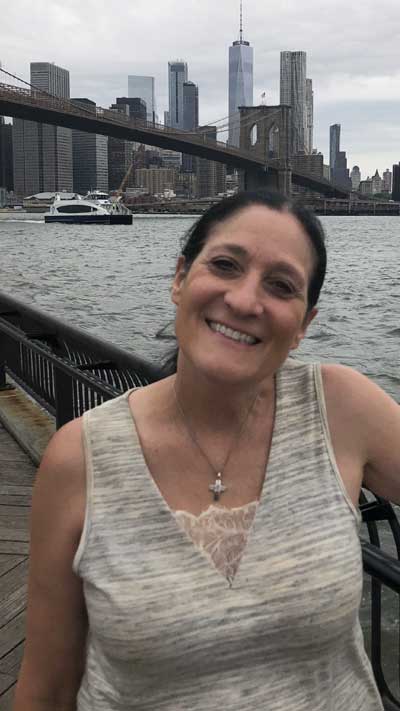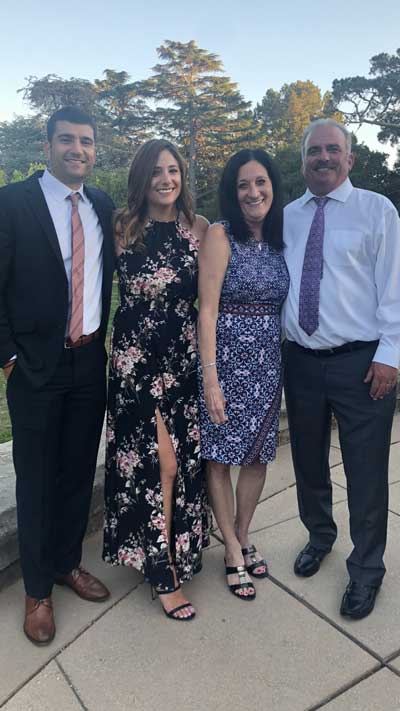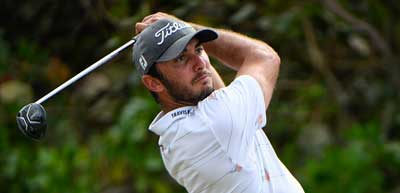
Double Your Impact for the Holidays
Double Your Impact for the Holidays
Your urgently needed year-end gift can go twice as far to provide care and support and accelerate Alzheimer's research this holiday season — and all year long. Show your giving spirit today during this 2x Match Challenge.
Donate NowPGA Tour Golfer Max Homa and Best Friend Share Their Experiences with Alzheimer’s Disease
Max Homa, a professional golfer on the PGA Tour, is best friend to Peter Pappageorge, whose mother Kathy has younger-onset (also known as early-onset) Alzheimer's. We sat down with Max and Peter to discuss how Alzheimer’s impacts not only the person with the disease and their family, but also the community as a whole.
Peter’s Story: Alzheimer’s Through a Son’s Eyes
“My mom was diagnosed with Alzheimer’s three years ago. She was 58 years old. For our family, it feels like a pretty unique situation. We never imagined that my mother would be affected at this early an age,” Peter says. Peter is 27 years old; his older sister is 30. Their parents Kathy and Nick will have been married for 33 years this August.
Although Peter’s family saw signs of Alzheimer’s in his mom, they still hoped for the best. “In my experience, most people see Alzheimer’s in their grandparents … to see the disease in someone so young, who was so strong and brilliant, is both fascinating and devastating.
My mom was a student at the University of California, Berkeley, the same school Max went to. Later on, she attended Hastings Law School in San Francisco. She practiced law until she was pregnant with my sister, ultimately sacrificing a career to raise her children. When she was about 51, she got back into the thick of it, practicing law when us kids were out of the house. But she couldn’t continue. She had taken a long time away from the law and quickly became exhausted.”
The first sign of Alzheimer’s that Peter saw in his mom was her speech. “She knew what she wanted to say, but couldn't finish sentences. Then she began repeating questions, and displaying general signs of confusion. My dad had sleepless nights, worrying that it was what we all thought it was.
All moms seem to have the incredible power of memory. Whether it was something like knowing that my sister and I had people over at the house when weren’t supposed to (returning to a house cleaner than she had left it,) or just her general brilliance, it hasn’t been easy watching my mom change.”
Peter recalls a favorite memory from around the time he was playing basketball at Long Beach State University. “We used to play a basketball game called Pig, and for some odd reason I could never beat my mom. She was a gymnast when she was younger and she would do these weird poses – behind-the-back shots, a crazy one-handed shot, standing on one leg, shots from her tippy toes – she always beat me and she was never even a basketball player! She was just amazing.”
 Peter wishes he had known more about the resources available to him and his family when his mother was first diagnosed with Alzheimer’s disease, but he says his extended family and friends were a huge support system to his family. “You definitely see a different side of people when adversity hits. My dad has sacrificed so much for my mom as her caregiver, and it’s incredible to see what he does, whether it’s day-to-day tasks or showing his love for my mom wherever he goes; he takes her with him everywhere. Her friends have been amazing, too, taking her to lunch or the movies. They also know how exhausting caregiving can be, and they make sure my dad has respite. They’ll say: “Hey, why don’t I take Kathy shopping on Friday so you can fit in a game of golf?” It’s amazing to see how people step up to the plate and show their love.”
Peter wishes he had known more about the resources available to him and his family when his mother was first diagnosed with Alzheimer’s disease, but he says his extended family and friends were a huge support system to his family. “You definitely see a different side of people when adversity hits. My dad has sacrificed so much for my mom as her caregiver, and it’s incredible to see what he does, whether it’s day-to-day tasks or showing his love for my mom wherever he goes; he takes her with him everywhere. Her friends have been amazing, too, taking her to lunch or the movies. They also know how exhausting caregiving can be, and they make sure my dad has respite. They’ll say: “Hey, why don’t I take Kathy shopping on Friday so you can fit in a game of golf?” It’s amazing to see how people step up to the plate and show their love.”
Peter feels supported, too. “Sometimes I want to talk about my mom, but in general, I’m not too open. I’m a guy’s guy. But Max knows what’s going on and I know that if I ever needed anything, he would be there.”
Max’s Story: Alzheimer’s Through a Friend’s Eyes
“Peter and I got really close quickly after we first met through a shared group of friends. We just hit it off,” Max says. “I have a connection to Alzheimer’s. My grandma had the disease. But she was older, and while it wasn’t an easy situation, I felt like it was more expected. In someone as young as Peter’s mother, it’s shocking and eye opening.
At first, as I got to know Peter’s family, nothing was mentioned about his mom having Alzheimer’s. Kathy is a lovely woman and they are an awesome family to spend time with.
It wasn’t until I had a tournament near Peter’s hometown and I stayed with his mom, dad and sister that I began to understand how scary and debilitating Alzheimer’s can be. That stay gave me a better understanding of the disease, and how it affects a family.”
 Max noticed that home was a comfort zone for Kathy, and how while going out in public was important for the family to keep things as normal as possible, it could be frustrating for her. He also learned how to emphasize with Peter. “It’s very difficult. Kathy is still very young and fun and lively. She just wants to be herself, but you can sense her frustration when she can’t get out words the way she wants to. She tried to talk golf with me, but couldn't piece all her thoughts together to form the words.
Max noticed that home was a comfort zone for Kathy, and how while going out in public was important for the family to keep things as normal as possible, it could be frustrating for her. He also learned how to emphasize with Peter. “It’s very difficult. Kathy is still very young and fun and lively. She just wants to be herself, but you can sense her frustration when she can’t get out words the way she wants to. She tried to talk golf with me, but couldn't piece all her thoughts together to form the words.
I’ve thought so much about what Peter and his family endure, and what Kathy is enduring. Seeing what Peter’s dad and sister do for her – supporting her every need, every day – allowed me to understand my friend’s experience more clearly, almost through his eyes.”
Max realizes the value of patience when facing Alzheimer’s … and love. “They all show so much of both. I’ve seen their family continue living their lives, but also more ready to handle any situation that may occur. It’s seamless. They try their best to understand what Kathy is going through, and that’s what’s so cool to see: a family that sticks together, through the good and the bad.
You never know what someone is facing, so it’s so important to be kind. What may seem like any other mom and dad and family out to dinner may actually be a family with much more going on below the surface. If you see someone in public who seems to be having difficulty – or even a meltdown – don’t make assumptions. Have compassion,” Max says.
While Max commends Peter as a son, Peter is grateful to Max for building Alzheimer’s awareness. “What Max is doing is special. He’s getting the word out there. There are still misconceptions out there about Alzheimer’s; more people need to recognize what the disease does to a person, and a family. If we can grow awareness, we’re one step closer to a cure.
You really don’t understand the value of a mom until it’s not the same. I can’t ask my mom if my leftover chicken is okay to eat, or if my dirty shirt goes in with the whites or darks. It’s a million little things. My advice to others dealing with Alzheimer’s is to be around the person as much as possible. Be with them. Treat them with respect. At the end of the day, you just want to give them everything that they gave you.”
During the upcoming Valero Texas Open April 4-7 in San Antonio, Max Homa will be wearing purple to support Peter and honor Kathy and all those living with Alzheimer's. Max will also be making a donation per birdie and eagle and is challenging others to match his efforts. Learn more here.
Related articles:
Caregiving
Get Involved
